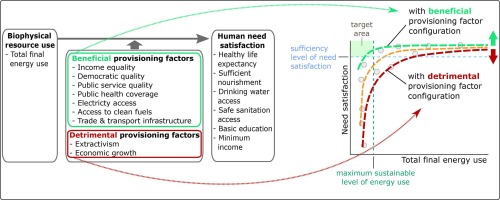Socio-economic Conditions for Satisfying Human Needs at Low Energy Use: An International Analysis of Social Provisioning
by
Jefim Vogel, Julia K. Steinberger, Daniel W. O’Neill, William F. Lamb, and Jaya Krishnakumar
(This article was first published in Global Environmental Change, July 2021)
Highlights
- No country sufficiently meets human needs within sustainable levels of energy use.
- Need satisfaction and associated energy requirements depend on socio-economic setups.
- Public services are linked to higher need satisfaction and lower energy requirements.
- Economic growth is linked to lower need satisfaction and higher energy requirements.
- Countries with good socio-economic setups could likely meet needs at low energy use.
Abstract
Meeting human needs at sustainable levels of energy use is fundamental for avoiding catastrophic climate change and securing the well-being of all people. In the current political-economic regime, no country does so. Here, we assess which socio-economic conditions might enable societies to satisfy human needs at low energy use, to reconcile human well-being with climate mitigation.
Using a novel analytical framework alongside a novel multivariate regression-based moderation approach and data for 106 countries, we analyze how the relationship between energy use and six dimensions of human need satisfaction varies with a wide range of socio-economic factors relevant to the provisioning of goods and services (‘provisioning factors’). We find that factors such as public service quality, income equality, democracy, and electricity access are associated with higher need satisfaction and lower energy requirements (‘beneficial provisioning factors’). Conversely, extractivism and economic growth beyond moderate levels of affluence are associated with lower need satisfaction and greater energy requirements (‘detrimental provisioning factors’). Our results suggest that improving beneficial provisioning factors and abandoning detrimental ones could enable countries to provide sufficient need satisfaction at much lower, ecologically sustainable levels of energy use.
However, as key pillars of the required changes in provisioning run contrary to the dominant political-economic regime, a broader transformation of the economic system may be required to prioritize, and organize provisioning for, the satisfaction of human needs at low energy use.

The complete article is here:
[This article is under Creative Commons license CC BY 4.0]
Jefim Vogel, et al